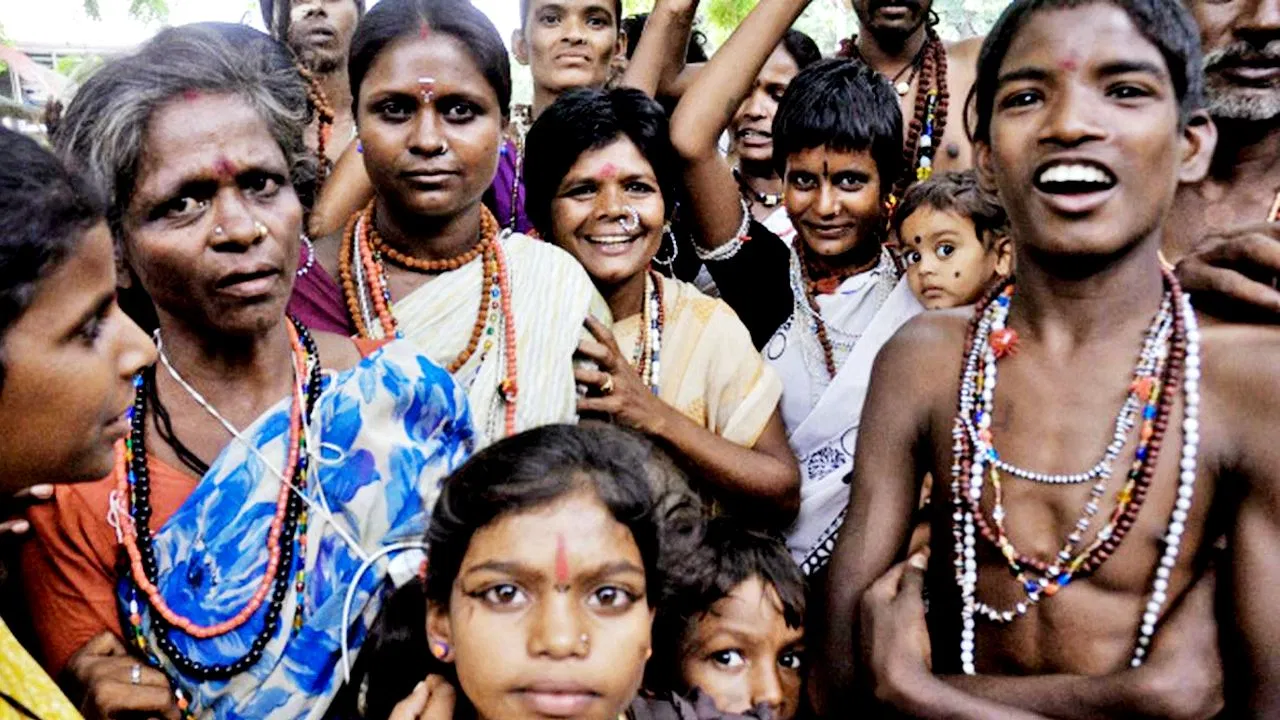Description

Disclaimer: Copyright infringement not intended.
Context
Recently, 114 tribal people from the Hakki Pikki tribal community in Karnataka got title deeds to the land they had been cultivating for about a century.
Details
- The Hakki Pikki tribe, also known as the Hakki Pikki Pardhis, is a distinct semi-nomadic tribal community in India.
- They have a rich history, unique traditions, and a distinctive way of life. This article delves into their origins, occupation, language, and cultural practices.
- They are predominantly found in the southern state of Karnataka, particularly in the forests and hilly regions of the Western Ghats.
Origins and Migration
- Name Significance: The name "Hakki Pikki" derives from the Kannada language, where "Hakki" means 'bird,' and "Pikki" means 'catchers.' Historically, they were known for their expertise in catching and hunting birds.
- Geographical Distribution: While their historical roots are believed to be in Northern India, particularly Gujarat and Rajasthan, the Hakki Pikki tribe is now predominantly found in the southern state of Karnataka. They also reside in forested areas of Western and Southern India.
- Scheduled Tribe Status: The Hakki Pikki tribe is officially recognized as a Scheduled Tribe in India, granting them certain privileges and protections under the Indian Constitution.

Occupation and Livelihood
- Transition from Hunting: Traditionally, the Hakki Pikki community relied on hunting and bird-catching for their livelihood. However, due to the enforcement of stricter wildlife conservation laws, they have transitioned to alternative occupations.
- Current Livelihood: Today, many Hakki Pikki individuals are engaged in occupations such as selling spices, flowers, Ayurvedic formulations, and herbal oils. They have also become traders and travel globally to market these products. Africa is a significant market for their goods, particularly as alternatives to Western medicine.
Culture and Lifestyle
- Traditional Clothing: Traditional attire for Hakki Pikki men consists of loincloths, while women wear sarees. They also adorn themselves with tribal jewelry and ornaments made from natural materials.
- Hunting and Gathering: Historically, hunting and gathering have been integral to the tribe's sustenance. They are skilled hunters, using traditional methods to catch small game and collect forest produce like fruits, roots, and honey.
- Housing: The Hakki Pikki people traditionally lived in temporary forest settlements or huts made from natural materials. However, in recent times, some have transitioned to more permanent housing.
- Social Structure: The tribe has a close-knit social structure, and their society is often divided into clans or extended families. The head of the family plays a significant role in decision-making.
Language and Endangered Heritage
- Distinct Language: Despite living in southern India, surrounded by Dravidian language speakers, the Hakki Pikki community maintains an Indo-Aryan language. Their mother tongue is referred to as "Vaagri."
- Endangered Language: UNESCO has recognized "Vaagri" as an endangered language, highlighting the need for preservation efforts to safeguard this unique linguistic heritage.
Rituals, Customs, and Society
- Religious Practices: The Hakki Pikki tribe follows Hindu traditions and participates in Hindu festivals. Their religious practices are deeply intertwined with their cultural identity.
- Marriage Practices: The tribe often prefers cross-cousin marriages. In their society, the groom provides a dowry to the bride's family, which is a distinctive feature of their matrimonial customs.
- Hair Symbolism: Among their customs, the eldest son in a family refrains from cutting his hair. This practice serves as a means of easy identification within the community.
- Diet: The Hakki Pikki people are non-vegetarians, with their diet including a variety of meat and other animal products.

Conclusion
The Hakki Pikki tribe, with its historical roots in bird-catching and hunting, has undergone significant cultural and occupational transformations over the years. While they have adapted to new livelihoods, their unique language and cultural practices remain integral to their identity. Efforts to document and preserve their language and heritage are essential to ensuring the continuation of this distinct tribal community in India.
|
PRACTICE QUESTION
Q. Which of the following statements about the Hakki Pikki Tribe is NOT correct?
- The Hakki Pikki tribe is predominantly found in the state of Kerala, India.
- They are traditionally known for their expertise in bird-catching and hunting.
- The Hakki Pikki people primarily speak Dravidian languages.
- UNESCO has recognized their mother tongue, "Vaagri," as an endangered language.
Options:
A) 1 and 2
B) 3 and 4
C) 1 and 3
D) 2 and 4
Answer: C)
|







